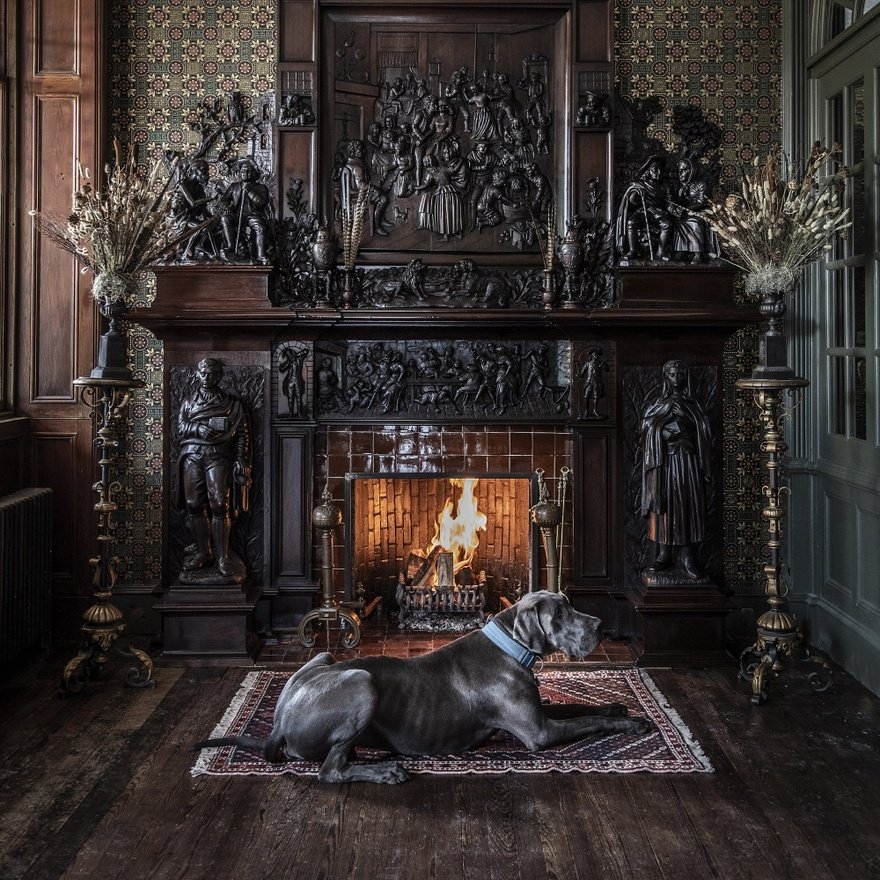Lockdown saw dog ownership soar, and those hotels with a dedicated dog menu and dog-walking service are attracting legions of canine-loving staycationers. Lottie Gross investigates the pet pound.
The statistics around dog ownership over the past 12 to 18 months are really quite staggering. The Pet Food Manufacturing Association estimates that one in three households in the UK now has a dog, and its research found that 3.2 million new pets were welcomed into homes during the coronavirus pandemic lockdowns in the UK.
Now, many of these new pets are hitting the road with their staycationing owners, and businesses without a welcoming pet policy are likely to lose out, as research from the Kennel Club has found.
Bill Lambert, the Kennel Club's spokesperson, explained: "As the hospitality sector begins to open up to the public again, research shows they would be wise to accommodate our four-legged friends, as 19% of the rapidly growing market of dog owners say they would take their custom elsewhere if they can't take their dog with them."
The dog-friendly travel and hospitality market was already fairly well established before the pandemic came along, with companies such as PetsPyjamas and Canine Cottages reaching hundreds of thousands of pet owners each year. But much like the interest in dogs soared during and after lockdown, the interest in dog-friendly travel has rocketed ever since.
Aimee Withrington from PetsPyjamas says: "We've seen an increase of 388% year-on-year for summer travel and this number is still increasing. With the surge in dog-owning households coupled with the uncertainty around travelling abroad during the remainder of 2021 and 2022, this demand will only increase."
After analysing online searches, Cofton Holidays says queries relating to dog-friendly trips have increased 665%, with more than 22,000 average monthly searches in 2021.
Time for walkies
One business that's capitalised on this trend is Hand Picked Hotels, a group of 19 luxury country houses and hotels across the UK. During the national lockdowns, the team took advantage of a quiet period and reflected on what their guests really wanted; dogs were at the top of the list, so they changed their no-pets policy to a dogs-welcome rule.
"While it was quiet," operations director Douglas Waddell says, "we were able to identify the rooms in each hotel that were most suitable for dogs, such as those that offered direct access to outdoors, making it easy for the dogs and their owners to pop in and out when needed.
"It just required a little work [to make them dog-friendly], for example, locks on both sides of the external doors and of course, the introduction of dog beds, bowls and treats, but it was well worth the adjustment, and the rooms were ready for when we were able to welcome leisure guests once again."
The benefits are already beginning to outweigh the investment, Waddell says: "We saw bookings from the get-go, so it was definitely the right decision, not just in terms of opening our business to a new audience, but being able to give our guests something that was important to them, and that is important to us." As a dog owner himself, Waddell understands the desire to bring your pet along to dinner or on holiday.
"We have certainly attracted guests who haven't been able to stay with us before," he said, "so although it's just a few bedrooms per hotel that we've deemed ‘dog-friendly', we would definitely feel the impact of removing the policy should we ever choose to."
Paws for thought
The ‘pet pound', as some call it, is a valuable one to attract, as pet owners have been proven to spend more on their pets than themselves. A study by Mintel in 2018 showed that millennials are among the most devoted to their dogs, with over 50% saying they would much rather cut back spending on themselves than cut back on their pets. With such a captive audience, providing pet-focused packages in hotels, like the Muddy Paws package at the Spread Eagle in Midhurst, West Sussex, or pet menus in restaurants could well be an extra revenue driver.
The benefits go beyond economics, though. The Kennel Club's research shows that welcoming dogs can also improve the atmosphere of a hospitality venue, with 62% of people saying their pet was a welcome conversation starter after a year of little socialising, and 61% said dogs make the atmosphere more friendly.
Even non-dog owners are keen to see more pets out and about in pubs and hotels: "A third of non-dog owners, who missed canine company during the lockdown period, claim that they are more likely to go to a place that allows dogs than one that doesn't," says Lambert.
The Kennel Club also believes that hospitality venues can help stave off a crisis for many dogs post-lockdown – they hope that by more establishments becoming dog-friendly, new owners who are getting back to "normal life" again might be less likely to pack their pet off to the rescue centre if it can fit in with their lifestyle better.
Of course, not all dog-friendly policies are made equal. There is a stark difference between dog-friendly and dog-tolerant. The former is less about just letting dogs in, but more about making them and their owners feel comfortable and welcome, and there's work to be done in terms of making an establishment a safe, enjoyable space for dogs and their owners.
Aurélie Four, a dog and wedding photographer and owner of Marcel le Corgi, her dog who has almost 140,000 Instagram followers, says it's about the extra touches for her, such as beds and bowls in the rooms, a dog-friendly dining area for dinners and breakfasts together, and areas where you can wash the dog before you go inside after muddy walks.
There's also a financial consideration, though: "Our favourite hotels often don't charge for dogs to stay, or if they do it is a reasonable fee that is justified by more than the usual ‘deep cleaning costs more'."
PetsPyjamas works with properties to sell rooms to their dog-owning database, but they'll only work with a hotel that offers those extras such as bowls, beds and a friendly fuss or gravy bone on arrival. The 46-bedroom Fife Arms in Braemar, Aberdeenshire, is one of the properties in their portfolio and the hotel is well known for its dog-loving tendencies.
"We love dogs at the Fife Arms; we have artworks immortalising them and a hotel bedroom dedicated to one. It doesn't feel quite right if there are no dogs in-house," a hotel team member told The Caterer. The property, which has always welcomed dogs into its rooms and inside its pub, the Flying Stag, is located in the Cairngorms National Park, a natural base for dog walkers.
Dogs get the usual bed, bowls and treats, but they also receive a letter addressed to them explaining how it all works and where they can and can't go within the hotel, as well as access to drying robes in the boot room, should they get soggy on a walk in the nearby wilderness.
Ask the dog concierge
It's a natural transition for countryside properties to implement a dog policy, but dog-friendly hotels are just as essential in the city, too. Kimpton has gone above and beyond with its dog-friendly rules, for example, offering access to a private gated garden for safe games of fetch in the city centre in the 199-bedroom Edinburgh Charlotte Square property, and an entire menu just for pets at the 334-bedroom London Fitzroy hotel. It's not just dogs they welcome, either: "if it fits in the lift, any pet is welcome" is their motto.
Iman Denney-Brown, media relations manager at IHG Hotels & Resorts, the parent company of the Kimpton brand, explains where the passion for pets came from: "Kimpton's pet policy started with Bill Kimpton, who had a miniature collie named Chianti – a nod to his favourite wine. Bill recognised first-hand the special bond a pet has with their human and the unique ability for animals to lift our spirits.
"Kimpton hotels has always made pets feel as welcomed and respected as their human counterparts and [the Fitzroy in London] has a dog concierge team that can help with any and everything to do with your pet – whether that be a dog-sitting or a dog-walking service."
The London property has partnered with local dog food company Marleybones to create a specially curated "ap-PET-isers menu", in which dogs are served a choice of beef or salmon with tasty, healthy accompaniments. There's even an option for hungry hedgehogs, hamsters, cats and rabbits.
Don't forget the cat people
It's not all fun and games, though. There are important considerations to take into account before adding any pet policies to a venue. While there are no health and safety laws barring dogs from restaurants, cafés or bars, the comfort of other guests should also be a priority, so pet-free areas could be a good idea.
Waddell explained the company's position: "Respecting the fact that we will have guests in-house without a dog, we took the decision not to allow dogs in our restaurants, but each of our properties has lounge and bar areas that are more informal where dogs are very welcome."
The brand also has a set number of rooms that are allocated for visitors with dogs, as does Kimpton, meaning any guests with allergies to animals can be guaranteed a pet-free room. At the Fife Arms, additional time is allocated to the housekeeping team when turning over a pet-friendly room, ensuring that it is hygienic for the next guests, whether they're with or without a dog.
Lambert says it's important to make it clear where dogs are allowed within a venue and where they must be on leads, and putting dog mess bins outside the property will keep any bad smells outside.
At hotels, in-room safety is paramount for dog owners, so some processes might need to change for dog-friendly rooms. "Make sure that any areas that dogs will have access to, including bedrooms, are safe and free of any plants and items that are toxic for dogs – like mini chocolates," says Lambert.
Once a pet policy is in place, marketing should be relatively easy. Pet owners flock to platforms like TikTok and Instagram to follow internet-famous animals including Marcel le Corgi and Doug the Pug, who has 13 million followers across a number of social media profiles.
"We've seen people book four weeks in a high-end serviced apartment building or a week in three rooms at a luxury London hotel after seeing them featured on Marcel le Corgi's Instagram," says Four.
"What I've learned while running [Marcel's] social media is that hospitality businesses need to be more clear about their dog-friendly policies, not exclude dogs based on size, and really make sure to understand dog owners and welcome them rather than tolerate them. It's OK to charge a fee for the dog to stay, but it has to be reasonable and justified, and additional services such as a menu for the dog, shop, treats, doggy afternoon tea, etc, can actually boost sales, because if people take their dogs with them they will totally spoil them if they have the chance."
It's OK to charge a fee for the dog to stay, but it has to be reasonable and justified
Tips for creating a dog-friendly hotel
- Provide a clear dog-friendly policy on your website and explain the rules to guests on arrival.
- Decide whether you want to have a limit on dogs per guest, and if bringing a dog along to hotels means guests pay a little extra.
- Ensure there's fresh water available for dogs either at their table or throughout your property during their time with you.
- Go the extra mile by providing pet-sitting or dog-walking services, a map for local walks nearby or even create a dog-wash area with warm water outside for post-walk wipe-downs.
Feature photo: 2017 Soloviova Liudmyla/shutterstock.com
Continue reading
You need to be a premium member to view this. Subscribe from just 99p per week.
Already subscribed? Log In







